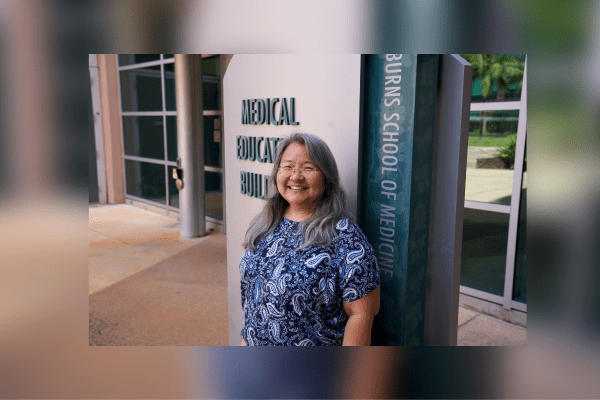
The John A. Burns School of Medicine aims to provide students with the capabilities to see and treat each patient as a whole. That’s why JABSOM students are trained in many facets of medicine, including biochemistry. Since 2005, Dr. Sheri Fong has taught biochemistry at JABSOM, and recently, she was named President-Elect of the Association of Biochemistry Educators. It has 164 members from many medical schools, including Canada and the Caribbean. She shares what this role will entail and how her time at JABSOM prepared her for this moment.
Q: How did you get involved with the Association of Biochemistry Educators?
A: I first went to a conference in 2011 but couldn’t attend another one until 2019. There was this eight-year gap where I wasn’t too involved, but in 2019, I ran for the board and was elected. I got involved in biochemistry projects, like writing exam questions, which led to another project around creating learning objectives. This suited me because this aligns with what we’re trying to do at JABSOM. We stress the clinical relevance of the foundational sciences so students understand what’s needed during clerkship.
Q: How does biochemistry fit into the curriculum at JABSOM?
A: Biochemistry concepts are learned in the first two years, and sometimes it is hard for students to see the tie between something like biochemistry and their desired career path. They can easily understand the relevance of pathology and physiology in our organ-based curriculum, but biochemistry is a little more difficult for them to see. It is one of the foundational sciences in our curriculum.
Q: You’ve been involved in biochemistry since your start at JABSOM, and you’re the biochemistry discipline coordinator. What led you down this path?
A: I have a bachelor’s in biology. My Master’s is in genetics, and my Ph.D. is in Cell and Molecular Biology. Biochemistry was my favorite of the chemistry courses I took as an undergrad. I liked it more than organic chem. So when I was doing my Ph.D., our lab was on the same floor as Scott Lozanoff. He was the chair of Anatomy, Biochemistry, and Physiology at the time. He asked me if I wanted to do any anatomy teaching, and I said, ‘no, thank you.’ Maybe a year later, he asked if I could do biochemistry, and I said, ‘sure, I could do that.’ What I like about biochemistry is letting the students know its essential role in everyday medicine. For example, if you’re missing a particular enzyme, it will explain why a doctor is seeing the symptoms and signs in a patient presentation. You know they’re either missing something important or they’re accumulating something toxic. I think it’s rewarding when they make that connection.
Q: Can you share some of the creative ways you’ve been able to help make that connection resonate with students?
A: In class, I focus on case reports. I give scenarios and ask them to offer their diagnosis. I then talk about the biochemistry behind each case. I’ve also made short videos that cover the normal pathways so we have more time in class to discuss different diseases.
Q: How rewarding is it when it all clicks for the student, and they make that connection?
A: It’s really exciting when I see students in their third year or fourth year come back and tell me they understand that biochemistry is really important because they saw it in the clinic. I think initially, it can be hard for them in the first two years because they’re not immersed in patient care yet. The link between patient care and biochemistry in the cells is just not intuitive yet.
Q: Being President-Elect of the ABE is a big deal! What will you be doing as President-Elect and then as President?
A: I’ll work with the rest of the board officers to develop and review drafts of policy and amendment proposals, review budgets, and make recommendations to the Board. I’ll co-chair the program committee of the biennial conference, which includes working with conference organizers to develop the biennial Conference agenda, proofread materials, and invite speakers. As President-Elect, I also serve as the Chair of the Membership Committee, and oversee the enrollment of new members.
Q: How excited are you for this role?
A: I’m excited because of the people I’ll be working with. I’ve known them for a while, and I know how dedicated they are. I really appreciate how nice and accommodating the ABE Board has been about the time difference. The President is at Vanderbilt, so the time difference is six hours. They’ve been great about trying to schedule meetings and webinars when I (and other people in Hawaii for the free webinars) can make them. It’s been a lot of fun just working with them. It’s a really amazing community with members who are really supportive of one another – just like JABSOM, except everyone is biochemistry!